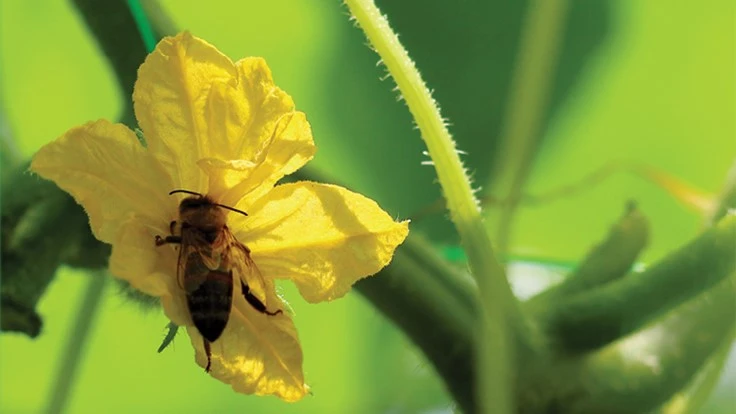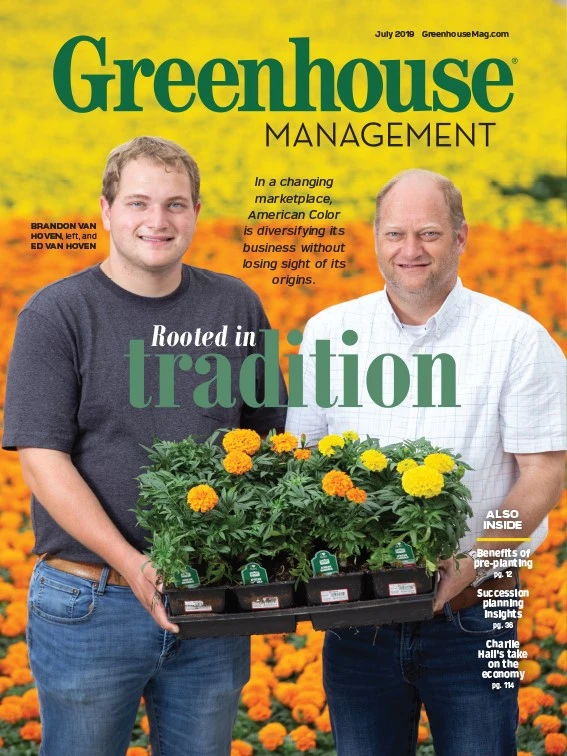
Here are some of the top headlines you might have missed
Mary Lewis named 2019 Ecke Scholarship winner
Mary Lewis, a graduate student at the University of Georgia, has been named the recipient of the American Floral Endowment’s 2019 Paul Ecke Jr. Scholarship.
“I think ornamental horticulture often gets a bad rap as something people do to get away from other people, when in reality, horticulturists are some of the best folks out there,” Lewis says. “Yes, sometimes they are strange as all get-out! But they are, like most artists, very passionate about what they do.”
Currently working toward a master’s degree in horticulture, Lewis graduated the University of Georgia two years ago with an already impressive C.V. Among other activities, she interned at Walt Disney World Resort’s Epcot theme park (supported by an AFE Vic and Margaret Ball internship/scholarship), testing new floral cultivars for production, maintaining crops and displays and conducting tours for guests.

Populating pollinators
Twelve years ago, the U.S. Senate designated a week in June as “National Pollinator Week” to address the decreasing pollinator populations. Now internationally recognized, it has grown into a celebration that is acknowledged by all environment lovers. This year’s Pollinator Week was June 17-23, and experts shared their updates and advice to assist with the continued protection of some of the ecosystem’s most valuable creatures.
How are pollinator numbers in the U.S. and Canada?
While this is great information to know, it’s difficult to answer. Honeybees and monarch butterflies have the most data, meaning, there is less data on other pollinators. According to Victoria Wojcik, the science and research director and Canadian program director for Pollinator Partnership, there are about 3,000 bee species in the U.S. and more than 800 in Canada. Wojcik also says that even though other pollinators may not have as much data as honeybees and monarch butterflies, there is just enough historic presence and absence information that helps researchers know their status.

ColorPoint KY switching to hemp production
Announced in mid-June, ColorPoint KY has transitioned to become a hemp-only company and has merged operations with AgTech Scientific of Paris, Kentucky. The fully vertically integrated hemp company will immediately become a leader of outdoor and indoor grown quality hemp products. The operations have been granted both a Hemp Grower License and Hemp Processor License from the Kentucky Department of Agriculture.
The companies met in 2017 and later formed a business relationship to produce clones beginning with the 2019 outdoor farming season. Additionally, a successful beta test of an indoor hemp grow in late 2018 led to a supply agreement between the companies that included agricultural processing, clones and an indoor grow during the summer season. The facility will feature a 1,837,847-square-foot greenhouse, including 145,182 square foot of production and shipping facilities. Also included: agricultural processing center, drying, stripping and milling of over 100,000 plants per day.
TPIE moving to Tampa in 2021, 2022
In June, The Florida Nursery, Growers and Landscape Association (FNGLA) announced that the Tropical Plant International Expo (TPIE) will be moving from the east side to west side of the Sunshine State after the TPIE in Fort Lauderdale on January 22-24, 2020. TPIE’s backdrop for 2021 and 2022 will be the redeveloped waterfront and urban offerings of Tampa Bay, Florida, as the show moves to the Tampa Convention Center.
“No matter where TPIE takes place, it will continue to be the best industry trade event focused on interior plants, tropical foliage, live décor and plant trends,” Marcella Lucio-Chinchilla, chairperson of TPIE and marketing director at Silver Vase, says. “We’ll continue to have the exciting exhibitor displays, cutting-edge presentations and an array of industry thought-leaders and influencers for which TPIE is so well-known. TPIE will continue as the best place to do business when it comes to the indoor tropical foliage and houseplant business.”

Getting the growing bug
Before he founded his own vertical farm right in his own apartment building, Adam Green’s journey through college was, as he calls it, “a winding road.” He started out at Drexel University in his native Philadelphia before he transferred to Syracuse University in Upstate New York, where he changed his major “three or four times.” Green then transferred again — this time to Temple University, back home in Philadelphia — and graduated with a degree in vocational development.
It was at Temple that horticulture got onto Green’s radar. He started shopping at farmers markets in Philadelphia and volunteering at an urban garden company, in 2017. Today, Green has launched his own business — AGreen Farms — a hydroponic indoor farm in Philadelphia growing microgreens, herbs, edible flowers and more.

Explore the July 2019 Issue
Check out more from this issue and find your next story to read.
Latest from Greenhouse Management
- Anthura acquires Bromelia assets from Corn. Bak in Netherlands
- Top 10 stories for National Poinsettia Day
- Langendoen Mechanical hosts open house to showcase new greenhouse build
- Conor Foy joins EHR's national sales team
- Pantone announces its 2026 Color of the Year
- Syngenta granted federal registration for Trefinti nematicide/fungicide in ornamental market
- A legacy of influence
- HILA 2025 video highlights: John Gaydos of Proven Winners





